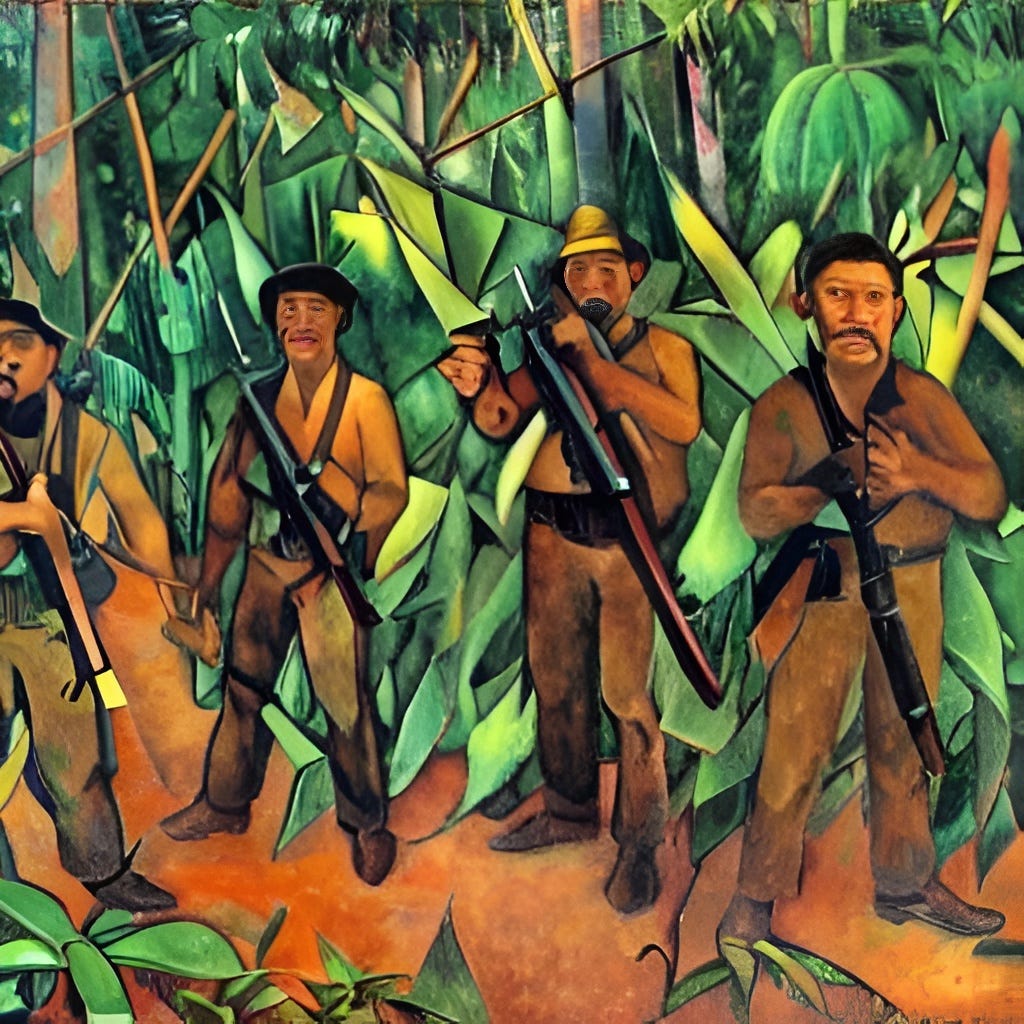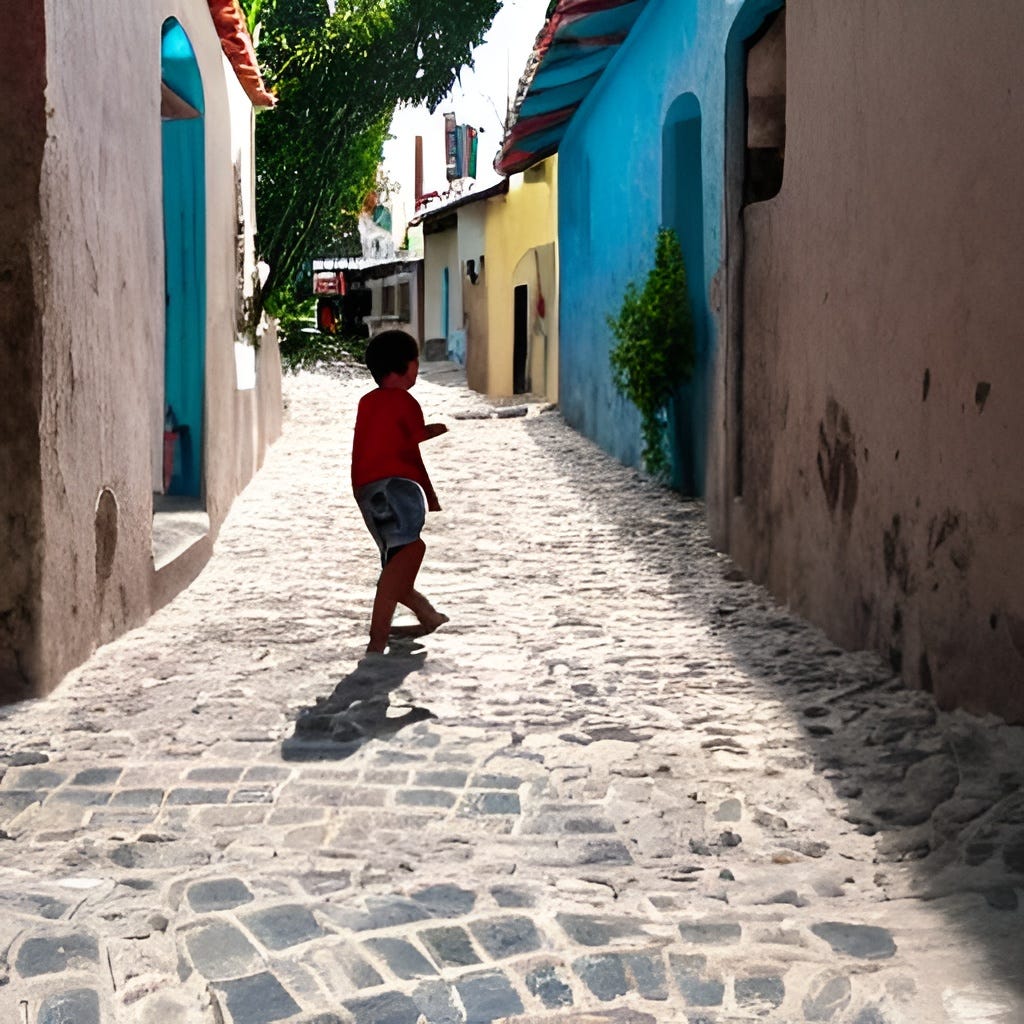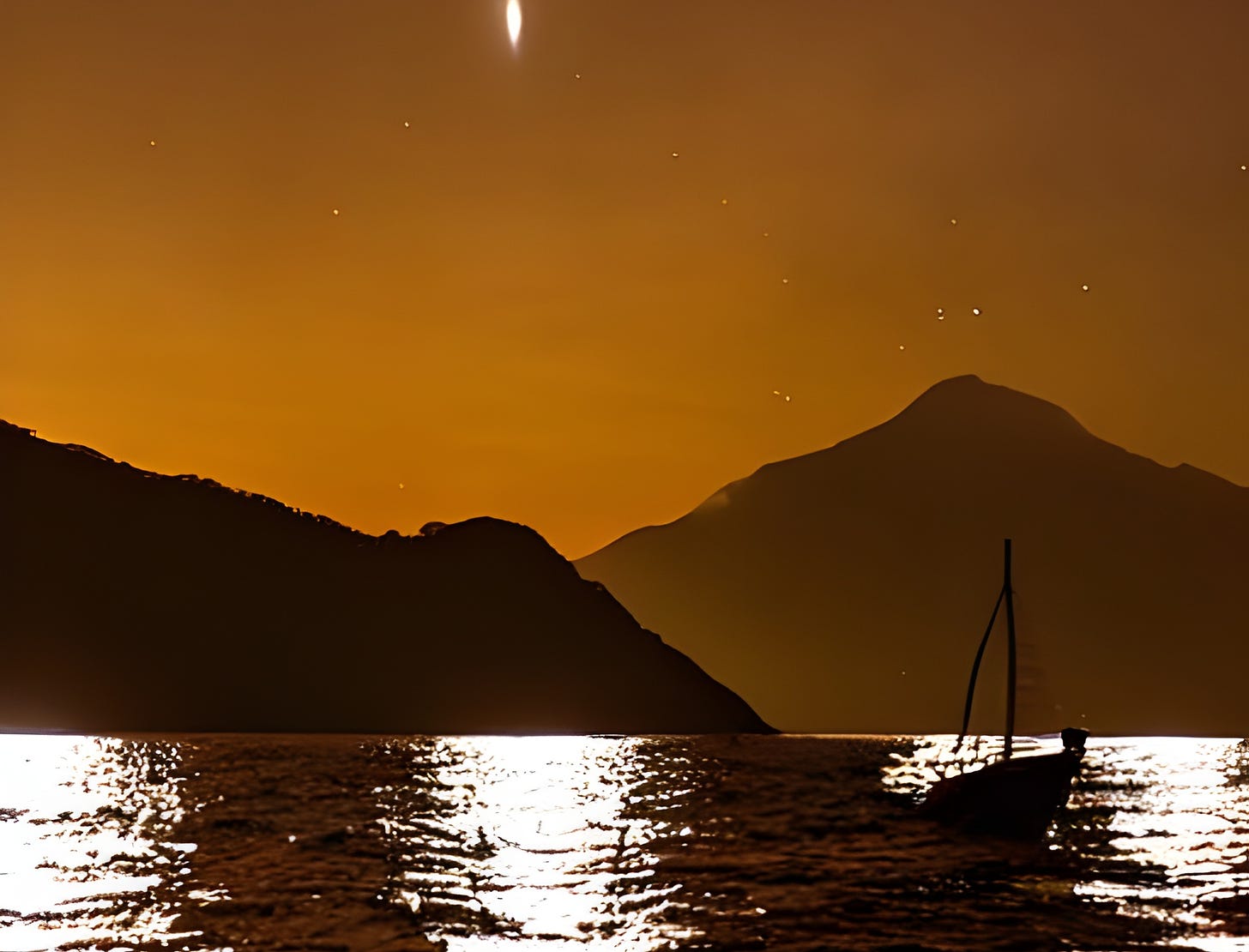Rebels of The Sierra Madre
Rebels of The Sierra Madre
Hallucinations, castigations, and celebrations of mañana in Mexico.
Traversing the cobbled hills of Bucerias between tacos de res and shots of mezcal a boy approaches with a dirty face and bare feet. He recognizes me from a prior transaction.
His Spanish doesn't register in the unusual winter afternoon of oppressive heat as the sweat beads play between the roots of my eyebrows.
“The rebels are near from the hills!” He points excitedly toward the Sierra Madre on the outskirts of town. Or maybe he was pointing to something else entirely.
The day before I gave him twenty pesos to whistle for a taxi and carry my groceries to the trunk of another white Nissan Sentra with creaking doors.
“It won't be much longer now until we're liberated. You should disappear Gringo before it's too late. They won't be happy to see you.”
“Como te llamas Chico?”
“Miguel. Meekhal in English.”
I pat the boy’s dry hair and tell him to get lost. The sickly-looking men in ball-hugging ripped jean shorts and florescent pink fishnet tank tops are spreading out away from the romantic zone.
“Spartacus Gringos Aqui? They like boys, no?”
“You won't want to find out. How fast can you run Miguelito?”
“On la cancha I am the fastest player. But I will not run from danger. The rebels are coming. I will hide and wait for their coming.”
I look down at his filthy feet.
“Do you play football barefoot?”
“All the boys do. I could wear Nike but you Gringo only give me twenty pesos.”
I keep walking up the hill toward the cantina with the courtyard where the green caged pajaritos mock you while you drink.
Miguel follows telling me of his football triumphs.
“You go to La Comer now? I help with your bags. I whistle for the taxi. Nobody can whistle louder.”
I hand him fifty pesos and tell him I don't need groceries.
“Gracias Señor.”
“You better run along now.”
He looks up the hill and sees two older Gringos walking crooked with their hands in each other’s back pockets.
Miguelito vanishes down an alleyway between two concrete pillars with rebar poking out from the sides and top.
Nothing is ever finished in Mexico. Each evolution of physical space and the atoms of spontaneous and invisible rearrangement appear in a state of hibernation.
At least until mañana.
Nothing will be completed today.
For everything, you’ll have to wait for tomorrow.
The dishwasher will be fixed tomorrow. He’s come down with an illness.
The flat tire will be replaced tomorrow. The spare is hunched over a bar in La Cruz.
The street repairs will have to wait. There are past jobs that were never finished that must come first.
The only inconvenienced are the new gringos hopping over potholes in flip-flops and aviators. Autopilot Tesla enthusiasts from San Juan Capistrano who visit their therapists twice a week just to be sure.
Miguelito pops his head out from behind a crumbling circular concrete column to add color, “And who smile stupidly at everyone they see in case they happen to finally be noticed and who before departing our great country will say to the man in a brown jumpsuit that mops the marble floor at the airport terminal, ‘The food cart tacos here are not as good as back home.’”
The new gringos don’t have the patience for mañana. Having been conditioned with expectations for immediacy they are perpetually disappointed by the frequencies that steer life in Mexico.
They will not be liberated.
At half past two, the green pajaritos in the cage of that courtyard cantina tell me I’ve consumed too much. The bright purple tablecloth with pink stitching is wet and tired of soaking the moisture from my beer bottles.
I want to hang it over the bird to cage to dry but the bartender has more than one belly and several breasts. He could smother me faster than his birds do with insults.
I flee the birds for the cobbled streets, stumbling down the hill past ten of the ten thousand incomplete construction projects that litter the nation.
The buildings will be finished in good time. For now, they are placeholder lots for storage towers of future Gringos in need of liberation.
Upon liberating themselves from the burdens up north, they will close escrow and take great pleasure in being insulted by birds while they drink.
The Americans are everywhere in Bucerias. The first Americans in sixty years who have not gone overseas to liberate but be liberated.
If Miguel is correct, soon the rebels will be charging down the slopes of the Sierra Madre to liberate these native people who will need liberating from the newly liberated Gringos driving up prices.
This culture of Mesoamerica has had so many sacrifices and made so many sacrifices for a millennium. Aztec, Zapotec, Talpotec, Tickec, Tec Tec.
Maya.
Sacrificing souls.
There were only 400 million souls on earth back then.
After their sacrifices they had their liberators too, holding crosses.
Making more sacrifices.
And then new ones came holding beakers and pencils.
Making more sacrifices.
For more fashionable superstitions.
The new technetronic liberators have no need for humans at all so there will be quantum sacrifices.
A crowd gathers near a white chapel in el Centro to hear the words of God.
The new rainbow God doesn’t speak their language anymore, so the people stop and beg for reassurance for their fears that rest where only fears know, in the future.
They scream out to the old Gods, “We’ve tried everything before and nothing seems to work. What do we do now?”
And the Gods over Tenochtitlan scream back to the descendants of tec Mex, “You cannot do Communism because there is no more need for workers! You will have no more Socialism because nobody is social anymore! You cannot try Fascism because Cartels are not incorporated here! And soon you will have no more Scientism because all the children will be sacrificed!”
The natives glance around with confusion, hoping for something more promising, before taking their children to the clinic for flu shots.
At the bottom of the hill I storm the beach and stroll south for a few minutes.
When my mouth goes dry I stop at a palapa bar for a cold pacifico. I take out a hundred peso bill, one of the shiny new red ones with the face of a Mexican writer on it, and fold it nicely on the finely polished teak bar.
They put writers on their money in Mexico.
They sentence and jail meme makers up north.
And prosecute ex-Presidents.
Who needs liberating? Who needs rebels in their mountains?
When the bartender turns his back I grab my bottle and continue on my walk.
The onshore breeze is still alive late in the afternoon carrying the salty mist from white caps splattering the bay. Further south down the beach, a group of boys moves a football in a triangle.
Miguel recognizes me and runs up the beach to greet me with an expectant look. He waits for me to say something or maybe give him money, but I’m all out of money.
“Don’t you ever go home, Chico?”
“My Abuela is sick with the covid. She tell me to leave and don’t come back for two days. She say she is contag- cont- scared that I get covid too.”
“There’s no covi—,” I almost spill the frijoles. “She’s just being cautious but kids like you don’t have to worry about that.”
“Why no?”
“It’s not dangerous for kids. For most people. Where are you going to sleep tonight?”
“Maybe tonight on the beach beneath the stars. But I have my friend. The one there, the one who kick the ball, his Papa is rich. They have five bedroom.”
“Go to the rich kid’s house. Be nice to his Papa, but especially have manners around Mama. If Mama likes you, Papa will too.”
“They both love me. They say I’m like a second son.”
“So why do you fetch taxis for Gringos?”
“Gringos see a barefoot boy and they feel sorry. It’s easy money.”
“You’re gonna be alright Miguel. I go now.”
“Wait, mister. Is the covid dangerous for Abuela? Will my Abuela live?”
“Keep her out of those Gringo hospitals. Those fancy clinics.”
“The private ones? She cannot afford those.”
“Good. Then she will live.”
Miguelito smiles at me before running back to remake the football triangle. I think of our encounter earlier in the afternoon.
“Wait! Miguel!”
He stops and turns back toward me.
“When will the rebels be here?”
“Rebels? What rebels?” He shakes his head and runs back to his game.
I stumble along the beach passing one trashy all-inclusive hotel after another. The latest liberated American with a warm bottle of beer heading nowhere in particular.
The sun fades slowly behind Punta Mita, leaving only a haze that feels like a lunar eclipse. My gait sways on the slanted sand, sinking with each step. I am not drunk nor sober but somewhere in between.
Along a kilometer of barren lots between two resorts, I suddenly stop. At the edge of some coconut palms, I plop my behind into a pile of warm sand to face the bay and watch the light disappear.
Some tourists on horseback gallop past along the water’s edge. Their horse hooves kick up sand holes leaving little pools to fill with the ebbing tide.
The wooden fishing boats creep toward the shallow waters after dark and cast their wide nets over cooling pools of tourist excretions.
As the tangerine horizon darkens and the first stars twinkle there is only one certainty in all of Mexico for mañana.
From the flat humid jungles of Campeche burning the mosquito mist of a thousand sacrificed children to the bubbling undercurrents beneath Citlaltépetl, to the millions of corruptible snakes that slither the passing boots of traffickers in the Sonora flat lands, tomorrow one thing will definitely happen.
Somewhere a man in an official uniform with tightly laced military boots and a patch of the tri-color Mexican flag on his bulging deltoid will say, “I’m not for sale. The border is that way.”
Source: The Good Citizen



Comments
Post a Comment